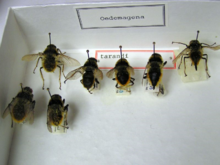| Reindeer warble fly | |
|---|---|

| |
| Scientific classification | |
| Domain: | Eukaryota |
| Kingdom: | Animalia |
| Phylum: | Arthropoda |
| Class: | Insecta |
| Order: | Diptera |
| Family: | Oestridae |
| Genus: | Hypoderma |
| Species: | H. tarandi
|
| Binomial name | |
| Hypoderma tarandi | |
| Synonyms | |
|
Oedemagena tarandi | |

Hypoderma tarandi, also known as the reindeer warble fly and reindeer botfly,[1] is a species of warble fly that is parasitic on reindeer.[2]
The larvae of this fly are a skin-penetrating ectoparasite that usually infest populations of reindeer and caribou in Arctic areas, causing harm to the hides, meat and milk in domesticated herds. They also may cause ophthalmomyiasis in humans,[3] leading to uveitis, glaucoma and retinal detachment.[4] H. lineatum and H. sinense may also infest humans.[4]
- ^ Lagacé-Wiens, PR; Dookeran, R; Skinner, S; Leicht, R; Colwell, DD; Galloway, TD (2008). "Human ophthalmomyiasis interna caused by Hypoderma tarandi, Northern Canada". Emerging Infect. Dis. 14 (1): 64–6. doi:10.3201/eid1401.070163. PMC 2600172. PMID 18258079.
- ^ Chillcott, in Stone et al., 1965, Catalog of the Diptera of America north of Mexico, p. 1112.
- ^ Samuelsson, Fredrik; Nejsum, Peter; Raundrup, Katrine; Vicky Alstrup Hansen, Tina; Moliin Outzen Kapel, Christian (2013). "Warble infestations by Hypoderma tarandi (Diptera; Oestridae) recorded for the first time in West Greenland muskoxen". International Journal for Parasitology: Parasites and Wildlife. 2: 214–216. Bibcode:2013IJPPW...2..214S. doi:10.1016/j.ijppaw.2013.06.001. PMC 3862539. PMID 24533338.
- ^ a b Lagacé-Wiens, P. R.; et al. (2008). "Human ophthalmomyiasis interna caused by Hypoderma tarandi, Northern Canada". Emerging Infectious Diseases. 14 (1): 64–6. doi:10.3201/eid1401.070163. PMC 2600172. PMID 18258079.